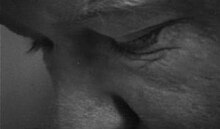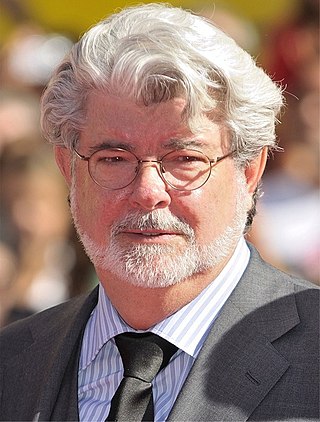
George Walton Lucas Jr. is an American filmmaker and philanthropist. Lucas created the Star Wars and Indiana Jones franchises and founded Lucasfilm, LucasArts, Industrial Light & Magic and THX. He served as chairman of Lucasfilm, before selling it to The Walt Disney Company in 2012. Lucas is one of history's most financially successful filmmakers and has been nominated for four Academy Awards. Lucas personally directed or conceived ten of the 100 highest-grossing movies at the North American box office, adjusted for ticket-price inflation. Lucas is considered to be one of the most significant figures of the 20th-century New Hollywood movement, and a pioneer of the modern blockbuster. Despite this, he has remained an independent filmmaker away from Hollywood for most of his career.

Star Wars is an American epic space opera media franchise created by George Lucas, which began with the eponymous 1977 film and quickly became a worldwide pop culture phenomenon. The franchise has been expanded into various films and other media, including television series, video games, novels, comic books, theme park attractions, and themed areas, comprising an all-encompassing fictional universe. Star Wars is one of the highest-grossing media franchises of all time.

Return of the Jedi is a 1983 American epic space opera film that is the sequel to Star Wars (1977) and The Empire Strikes Back (1980). It is the third installment in the original Star Wars trilogy and the sixth chronological film in the "Skywalker Saga". It is directed by Richard Marquand based on a screenplay by Lawrence Kasdan and George Lucas from a story by Lucas, who was also the executive producer. The film follows the ongoing struggle between the malevolent Galactic Empire and the freedom fighters of the Rebel Alliance. As the Rebels attempt to destroy the Empire's second Death Star, Luke Skywalker hopes to bring his father, Darth Vader, back from the dark side of the Force. The film stars Mark Hamill, Harrison Ford, Carrie Fisher, Billy Dee Williams, Anthony Daniels, David Prowse, Kenny Baker, Peter Mayhew and Frank Oz.
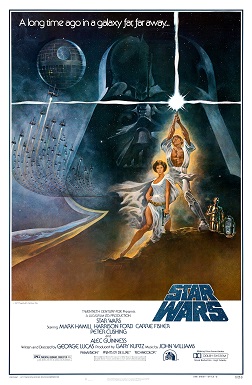
Star Wars is a 1977 American epic space opera film written and directed by George Lucas, produced by Lucasfilm and distributed by Twentieth Century-Fox. It was the first film released in the Star Wars film series and the fourth chronological chapter of the "Skywalker Saga". Set "a long time ago" in a fictional galaxy ruled by the tyrannical Galactic Empire, the story follows a group of freedom fighters known as the Rebel Alliance, who aim to destroy the Empire's newest weapon, the Death Star. When the Rebel leader Princess Leia is abducted by the Empire, Luke Skywalker acquires stolen architectural plans of the Death Star and sets out to rescue her while learning the ways of a metaphysical power known as "the Force" from the Jedi Master Obi-Wan Kenobi. The cast includes Mark Hamill, Harrison Ford, Carrie Fisher, Peter Cushing, Alec Guinness, Anthony Daniels, Kenny Baker, Peter Mayhew, David Prowse, and James Earl Jones.
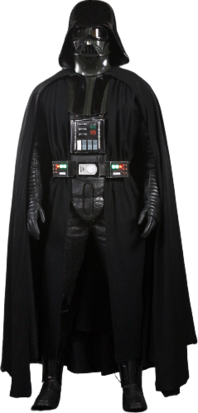
Darth Vader is a character in the Star Wars franchise. He is the primary antagonist of the original film trilogy and, as Anakin Skywalker, is the protagonist of the prequel trilogy. Born a slave on the planet Tatooine, he becomes a powerful Jedi. He is lured to the dark side of the Force by Chancellor Palpatine, and becomes the Sith Lord Darth Vader. After being severely wounded in a lightsaber battle, he is transformed into a cyborg. He is the husband of Padmé Amidala and the biological father of Luke Skywalker and Leia Organa Solo.

Willow is a 1988 American dark fantasy drama film directed by Ron Howard and produced by Nigel Wooll. The film was executive produced by George Lucas and written by Bob Dolman from a story by Lucas. The film stars Val Kilmer, Joanne Whalley, Warwick Davis, and Jean Marsh. Davis portrays the title character, an aspiring magician who teams up with a disaffected warrior (Kilmer) to protect a young baby princess from an evil queen (Marsh).
The University of Southern California School of Cinematic Arts (SCA) houses seven academic divisions: Film & Television Production; Cinema & Media Studies; John C. Hench Division of Animation + Digital Arts; John Wells Division of Writing for Screen & Television; Interactive Media & Games; Media Arts + Practice; Peter Stark Producing Program.
The original Star Wars trilogy, formerly marketed as the Star Wars Trilogy, is the first set of three films produced in the Star Wars franchise, an American space opera created by George Lucas. It was produced by Lucasfilm and distributed by 20th Century Fox, and consists of Star Wars (1977), The Empire Strikes Back (1980) and Return of the Jedi (1983). Beginning in medias res, the original trilogy serves as the second act of the nine-episode Skywalker Saga. It was followed by a prequel trilogy between 1999 and 2005, and a sequel trilogy between 2015 and 2019. Collectively, they are referred to as the "Skywalker Saga" to distinguish them from spin-off films set within the same universe.
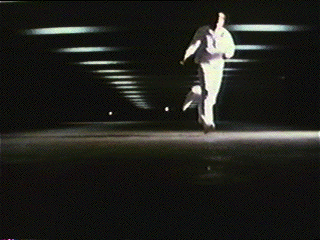
Electronic Labyrinth: THX 1138 4EB is a 1967 social science-fiction short film written and directed by George Lucas while he attended the University of Southern California's film school. Lucas reworked the short into the 1971 theatrical feature THX 1138.

George Lucas in Love is a 1999 American parodical short film directed by Joe Nussbaum. A parody of Shakespeare in Love, it depicts a young George Lucas and his real-life inspirations behind the characters and plot of Star Wars. Upon its release, the film was widely passed around Hollywood offices and served as Nussbaum’s break into the film industry. Lucas himself reacted to the film positively.
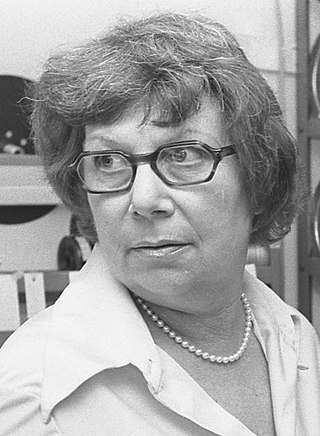
Verna Fields was an American film editor, film and television sound editor, educator, and entertainment industry executive. In the first phase of her career, from 1954 through to about 1970, Fields mostly worked on smaller projects that gained little recognition. She was the sound editor for several television shows in the 1950s. She worked on independent films including The Savage Eye (1959), on government-supported documentaries of the 1960s, and on some minor studio films such as Peter Bogdanovich's first film, Targets (1968). For several years in the late 1960s, she was a film instructor at the University of Southern California. Her one major studio film, El Cid (1961), led to her only industry recognition in this phase of her career, which was the 1962 Golden Reel award for sound editing.

Marcia Lou Lucas is an American film editor. She is best known for her work editing the Star Wars trilogy (1977–1983) as well as other films by her then-husband George Lucas: THX-1138 (1971) and American Graffiti (1973). She also edited Martin Scorsese's Alice Doesn't Live Here Anymore (1974), Taxi Driver (1976), and New York, New York (1977).
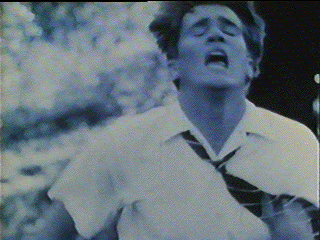
Freiheit is a 1966 short film by George Lucas, made while he was a student at the University of Southern California's film school. His third film, it was the first to contain a narrative.
Filmmaker, or "Filmmaker: a diary by george lucas", is a 32-minute documentary made in 1968 by George Lucas about the making of Francis Ford Coppola's 1969 film The Rain People.
Charles Davenport Champlin was an American film critic and writer.

Sheev Palpatine is a fictional character in the Star Wars franchise created by George Lucas. He first appears on screen in The Empire Strikes Back (1980), in which he is credited as The Emperor, and is the overarching antagonist of the three film trilogies in the Skywalker Saga, in which he is portrayed by Ian McDiarmid. The character is also known by his Sith name, Darth Sidious, which was first used in the novelization of The Phantom Menace (1999). In creating Palpatine, Lucas was inspired by real-world examples of democratic backsliding during the rise and rule of dictators such as Julius Caesar, Napoleon Bonaparte, and Adolf Hitler.
The Force is a metaphysical and ubiquitous power in the Star Wars fictional universe. "Force-sensitive" characters use the Force throughout the franchise. Heroes like the Jedi seek to "become one with the Force", matching their personal wills with the will of the Force, while the Sith and other villains exploit the Force and try to bend it toward their own selfish and destructive desires. The Force has been compared to aspects of several world religions, and the phrase "May the Force be with you" has become part of pop culture vernacular.

Jabba Desilijic Tiure, more commonly known as Jabba the Hutt, is a fictional character and major antagonist in the Star Wars franchise. Created by George Lucas, Jabba is voiced by Larry Ward with several puppeteers inside a one-ton puppet portraying him in Return of the Jedi. He was originally supposed to first appear in Star Wars (1977) as a stop motion character with Declan Mulholland as his stand-in. Jabba was later added into the film as a CGI character when it was re-released in Special Edition in 1997. He also appears in the prequel movie The Phantom Menace. The character is a large slug-like creature based on annelid worms, but he was originally designed as an apelike figure.

Lorella De Luca was an Italian film, television, and voice actress. One of the most recognized ingénues of Italian cinema during the mid-to-late 1950s, she is best known for having played naive young girls in dramas and comedies.
Anyone Lived in a Pretty How Town is a 1967 short film made by George Lucas inspired by E. E. Cummings' poem of the same name.
